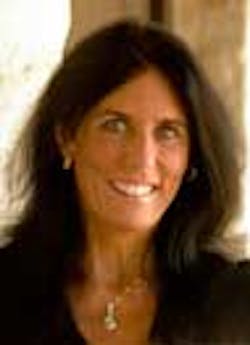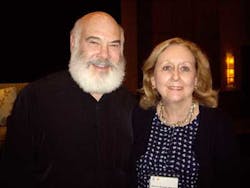THE HYGIENIST'S ROLE IN INTEGRATIVE MEDICINE
BY NANCY W. BURKHART, BSDH, EdD
I recently had the pleasure of attending the ninth annual Nutrition & Health Conference Seminar through the University of Arizona Center for Integrative Medicine, which was hosted in Boston. I have previously attended this meeting, and I am always amazed at the wide array of health education material that is presented on various topics. Since I also have a master's degree in health education, my focus is always on a broad area of total health.
The focus of this year's meeting was the obesity epidemic that we face in the world. The United States is at the top of the list in dealing with this epidemic. Dr. Robert H. Lustig from the University of California in San Francisco was a key speaker and opened the first day by speaking on "The trouble with fructose: a Darwinian perspective." The session addressed the crises we face in obesity and presented some staggering numbers and facts regarding the detrimental toll that fructose has and is taking on individuals, especially here in the United States -- not with just obesity but with major disease states such as diabetes and cancer.
Some key faculty associated with this organization are Drs. Andrew Weil and Tieraona Low Dog. Both adhere to a total body approach to wellness, including diet, exercise, environmental factors, and mental health. The four-day seminar is impressive and hosts like-minded professionals who incorporate these concepts into their own practices. Many presenters are in an academic setting but also treat patients in their practices, such as Drs. Weil and Low Dog do.
The seminar hosts small group formats, panel discussions, and large lecture series on various topics and even cooking demonstrations. All meals are based on the concepts that are espoused by the nutrition and integrative experts with formal meals provided. There are even healthy "tastings" during morning and afternoon breaks.
Additionally, the vendors at the conference were from businesses that I use already for myself such as "Nordic Naturals" and "Vital Choice" that produce the best seafood you can imagine. Since I am from Charleston, S.C., I will say that "fresh caught" fish is my favorite. I do not eat red meat and rarely eat chicken, so seafood is my staple. Other vendors were helpful in giving excellent information.
I heard Dr. Weil speak a few years ago at this meeting and have repeated his comments in my columns several times. His concepts are simple but so valuable:
- Don't feed yourself in the same place you feed your car!
- If your great grandmother would not recognize what you are about to place in your mouth, don't do it!
- If the product has more than five ingredients, you do not need it.
- If you would not put the substance in your mouth, don't place it on your skin!
This is great advice for anyone. The simple message is to assess: "Is it found in nature?" and pay attention to what you are eating, coming in contact with daily, and don't forget to breathe!
I was granted an interview with Dr. Low Dog and asked her some questions about health care in general, herbal supplements, and how we can incorporate more of these concepts into our dental world. Dr. Low Dog speaks at several dental meetings, and I was happy to have the chance to relay some of her concepts for this column.
Dr. Low Dog's extensive career in studying natural medicine began more than 30 years ago. Prior to receiving her doctor of medicine degree from the University of New Mexico School of Medicine, she studied massage therapy, midwifery, herbal medicine, and martial arts. She is a clinical associate professor of medicine and the fellowship director for the Arizona Center for Integrative Medicine.
Dr. Low Dog has spoken at more than 500 scientific conferences, published 34 peer-reviewed articles, written 18 chapters for medical textbooks, and is the author of the new book by National Geographic, "Life is Your Best Medicine."
Dr. Low Dog spoke about the her techniques for assessing the problems the patient may have and suggests that many of the symptoms may be related to drug interactions and also to the foods or supplements that the patient may be consuming.
Having the patient keep a diet diary (we all learned this in school, remember?) is very beneficial. The patient may need a few days or even weeks to begin to see patterns of the foods consumed and the symptoms that occur or those that subside. The system needs a few days to clear products and then suspect foods are avoided or others can be added back in slowly. Foods such as cinnamon may stabilize glucose and simple products that your great grandmother used are really medicinal in many cases -- lemon balm, slippery elm, ginger, garlic, elderberry, curcumin, the wide variety of teas, etc.
A quote from Dr. Low Dog beautifully expresses the concept that she promotes, "The division between conventional and traditional medicine is as artificial as the division between science and nature. They can be woven together in a fashion that meets our physical, emotional, and spiritual needs. This is the foundation upon which integrative medicine is built."
The other side is that some supplemental agents may not only enhance medications but they may also interact negatively as well. Dr. Low Dog mentioned that a national survey reported that 72% of people using herbal remedies were also taking prescription drugs, and 84% were taking over-the-counter drugs.
Dr. Low Dog completes a thorough health history and advises her patients to bring in all medications and supplements so that she can evaluate them. Sometimes, patients also begin taking supplements or altering medications without informing the primary physician or the dentist/hygienist.
Dr. Low Dog had many comments and tips for menopausal women that she mentioned during the seminar. Some of the herbal type supplements work very well for many, but she cautioned that a primary health-care provider should assess all medications and herbals that the woman is using in combination.
I mentioned that I hoped that dentistry would begin to incorporate many of the suggestions that I was hearing at the meeting. Talking to patients about health risk and nutrition should be an important part of what we do as health-care providers. Dental health is certainly a large part of this total health concept. Dr. Low Dog and I talked about how much can be assessed about the patient during the extraoral exam and the health history. Referring patients for other evaluations is so important. Many disease states manifest in the skin and the eyes. Since I founded and co-host the International Oral Lichen Planus Support Group, I was especially interested in any remedies that may assist patients with lichen planus. We will be working on that segment of the population in the future.
Hygienists have more time with the patient than any other health-care provider. We also have a captive audience. Having a healthy lifestyle yourself, and being in an office that promotes healthy concepts provide even more credibility to the health information that you provide. I am a huge proponent of written patient education materials for various entities. However, offices that have tanning bed discount coupons and baked cookies may want to rethink what concepts they are promoting. Diet and exercise are certainly the largest part of a total health concept.
As always, keep listening to your patients and always ask good questions. RDH
Past RDH Issues



